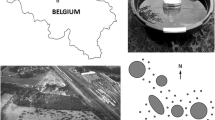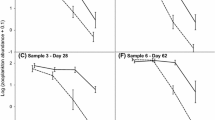Abstract
Human activities such as the application of agrochemicals may detrimentally disturb natural ecosystems, generating novel selection pressures. Here we examine how pesticides may influence community composition using the aquatic communities within bromeliad phytotelmata, and how adaptive responses to pesticides may influence community-level patterns. We first quantified the composition of macroinvertebrate communities from pesticide-free and pesticide-exposed locations. Complementary manipulative experiments where bromeliads were transplanted between pesticide-free and pesticide-exposed sites were then performed. Finally, pesticide bioassays on the most common predators (Mecistogaster modesta damselflies) and prey (Wyeomyia abebela mosquitoes) assessed a potential evolutionary mechanism that may influence community compositional differences. Our field survey revealed differences in W. abebela and M. modesta abundances between pesticide-free and pesticide-exposed areas. Our transplant experiment suggested compositional differences were not due to physical differences between bromeliads from different locations. Pesticide bioassays revealed that M. modesta from pesticide-free locations had higher innate pesticide tolerances than W. abebela from pesticide-free areas, but M. modesta larvae showed no evidence of adapted resistance as none were found where pesticides were used. Conversely, W. abebela larvae from pesticide-exposed locations had higher pesticide tolerances than individuals from pesticide-free sites, suggesting an adaptive response. This evolved resistance to pesticides may, therefore, allow W. abebela to colonize habitats free of the dominant predator in the system, explaining the higher W. abebela abundances in pesticide-exposed areas than in pesticide-free locations. We suggest that the total effect of novel stressors is driven by interactions between ecological and evolutionary processes.




Similar content being viewed by others
References
Amundrud SL, Srivastava DS (2016) Trophic interactions determine the effects of drought on an aquatic ecosystem. Ecology 97:1475–1483. https://doi.org/10.1890/15-1638.1
Araya J (2015) Costa Rica es el consumidor más voraz de plaguicidas en el mundo. Sem. Universidad, Univ. Costa Rica, Costa Rica
Atwood TB, Hammill E, Srivastava DS, Richardson JS (2014) Competitive displacement alters top-down effects on carbon dioxide concentrations in a freshwater ecosystem. Oecologia 175:353–361. https://doi.org/10.1007/s00442-013-2877-3
Bernhardt ES, Rosi EJ, Gessner MO (2017) Synthetic chemicals as agents of global change. Front Ecol Environ 15:84–90. https://doi.org/10.1002/fee.1450
Bisset JA, Marín R, Rodríguez MM et al (2013) Insecticide resistance in two Aedes aegypti (Diptera: Culicidae) strains from Costa Rica. J Med Entomol 50:352–361. https://doi.org/10.1603/ME12064
Boivin NL, Zeder MA, Fuller DQ et al (2016) Ecological consequences of human niche construction: Examining long-term anthropogenic shaping of global species distributions. Proc Natl Acad Sci 113:6388–6396. https://doi.org/10.1073/pnas.1525200113
Carazo-Rojas E, Chin-Pérez-Rojas G, Pérez-Villanueva M et al (2018) Pesticide monitoring and ecotoxicological risk assessment in surface water bodies and sediments of a tropical agro-ecosystem. Environ Pollut 241:800–809. https://doi.org/10.1016/j.envpol.2018.06.020
Carlson SM, Cunningham CJ, Westley PAH (2014) Evolutionary rescue in a changing world. Trends Ecol Evol 29:521–530. https://doi.org/10.1016/j.tree.2014.06.005
Chareonviriyaphap T, Bangs MJ, Suwonkerd W et al (2013) Review of insecticide resistance and behavioral avoidance of vectors of human diseases in Thailand. Parasites Vectors 6:1. https://doi.org/10.1186/1756-3305-6-280
Clements WH, Hickey CW, Kidd KA (2012) How do aquatic communities respond to contaminants? It depends on the ecological context. Environ Toxicol Chem 31:1932–1940
Congdon JD, Dunham AE, Hopkins WA et al (2001) Environmental toxicology resource allocation-based life histories: a conceptual basis for studies of ecological toxicology. Environ Toxicol Chem 20:1698–1703. https://doi.org/10.1002/etc.5620200811
Corlett RT (2015) The Anthropocene concept in ecology and conservation. Trends Ecol Evol 30:36–41
Credland PF (1983) Organization of the cuticle of an aquatic fly larva. Tissue Cell 15:447–488
Daly GL, Lei YD, Teixeira C et al (2007) Accumulation of current-use pesticides in neotropical montane forests. Environ Sci Technol 41:1118–1123. https://doi.org/10.1021/es0622709
Diepens NJ, Pfennig S, Van Den Brink PJ et al (2014) Effect of pesticides used in banana and pineapple plantations on aquatic ecosystems in Costa Rica. J Environ Biol 35:73–84
Evans AR, Jones D, Boyer AG et al (2012) The maximum rate of mammal evolution. Proc Natl Acad Sci 109:4187–4190. https://doi.org/10.1073/pnas.1120774109
Fendt L (2015) Costa Rica consumes more agrochemicals per hectare than any country in the world. The Tico Times. https://ticotimes.net/2015/06/07/costa-rica-consumes-agrochemicals-per-hectare-country-world
Finney DJ (1982) Probit Analysis, a statistical treatment of the sigmoid response curve. Cambridge University Press, Cambridge
Fouet C, Atkinson P, Kamdem C (2018) Human interventions: driving forces of mosquito evolution. Trends Parasitol 34:127–139. https://doi.org/10.1016/j.pt.2017.10.012
Galt RE (2008) Beyond the circle of poison: significant shifts in the global pesticide complex, 1976-2008. Glob Environ Change 18:786–799. https://doi.org/10.1016/j.gloenvcha.2008.07.003
Garcerá C, Cunha JP, Moltó E, Chueca P (2012) Measured and predicted drift in pesticide applications of citrus in Spain. In: Power and Machinery. In: International conference of agricultural engineering-CIGR-AgEng 2012: agriculture and engineering for a healthier life, Valencia, Spain, 8-12 July 2012. CIGR-EurAgEng
Gilbert B, Srivastava DS, Kirby KR (2008) Niche partitioning at multiple scales facilitates coexistence among mosquito larvae. Oikos 117:944–950. https://doi.org/10.1111/j.0030-1299.2008.16300.x
Guedes RNC, Smagghe G, Stark JD, Desneux N (2016) Pesticide-induced stress in arthropod pests for optimized integrated pest management programs. Annu Rev Entomol 61:43–62. https://doi.org/10.1146/annurev-ento-010715-023646
Hall DG, Richardson ML, Ammar ED, Halbert SE (2013) Asian citrus psyllid, Diaphorina citri, vector of citrus huanglongbing disease. Entomol Exp Appl 146:207–223. https://doi.org/10.1111/eea.12025
Hammill E, Atwood TB, Corvalan P, Srivastava DS (2015a) Behavioural responses to predation may explain shifts in community structure. Freshw Biol. https://doi.org/10.1111/fwb.12475
Hammill E, Atwood TB, Srivastava DS (2015b) Predation threat alters composition and functioning of bromeliad ecosystems. Ecosystems 18:857–866. https://doi.org/10.1007/s10021-015-9866-9
Hirzel AH, Le Lay G (2008) Habitat suitability modelling and niche theory. J Appl Ecol 45:1372–1381. https://doi.org/10.1111/j.1365-2664.2008.01524.x
Holdgate MW (1956) Transpiration through the cuticles of some aquatic insects. J Exp Biol 33:107–118
Jansen M, Coors A, Stoks R, De Meester L (2011) Evolutionary ecotoxicology of pesticide resistance: a case study in Daphnia. Ecotoxicology 20:543–551
Johnson MTJ, Munshi-South J (2017) Evolution of life in urban environments. Science (80-). https://doi.org/10.1126/science.aam8327
Johnson LA, Welch B, Whitfield SM (2013) Interactive effects of pesticide mixtures, predators, and environmental regimes on the toxicity of two pesticides to red-eyed tree frog larvae. Environ Toxicol Chem 32:2379–2386. https://doi.org/10.1002/etc.2319
Kibuthu TW, Njenga SM, Mbugua AK et al (2016) Agricultural chemicals: life changer for mosquito vectors in agricultural landscapes? Parasit Vectors 9:500. https://doi.org/10.1186/s13071-016-1788-7
Lounibos LP, Frank JH (2009) Insects and allies associated with bromeliads: a review. Terr Arthropod Rev 1:125–153. https://doi.org/10.1163/187498308X414742
Marino NAC, Srivastava DS, Farjalla VF (2013) Aquatic macroinvertebrate community composition in tank-bromeliads is determined by bromeliad species and its constrained characteristics. Insect Conserv Divers 6:372–380. https://doi.org/10.1111/j.1752-4598.2012.00224.x
Martin AP, Palumbi SR (1993) Body size, metabolic rate, generation time, and the molecular clock. Proc Natl Acad Sci USA 90:4087–4091. https://doi.org/10.1073/pnas.90.9.4087
McGill BJ, Dornelas M, Gotelli NJ, Magurran AE (2015) Fifteen forms of biodiversity trend in the Anthropocene. Trends Ecol Evol 30:104–113
Melnychuk MC, Srivastava DS (2002) Abundance and vertical distribution of a bromeliad-dwelling zygopteran larvae, Mecistogaster modesta, in a Costa Rican rainforest (Odonata: Pseudostigmatidae). Int J Odonatol 5:81–97. https://doi.org/10.1080/13887890.2002.9748178
Morse NB, Pellissier PA, Cianciola EN et al (2016) Laboratorio Nacional de Insumos Agrícolas—LANIANoreporte : 19:4227364. https://doi.org/10.5751/es-06192-190212
Ngai JT, Srivastava DS (2006) Predators accelerate nutrient cycling in a bromeliad ecosystem. Science (80-) 314:2006. https://doi.org/10.1126/science.1132598
Oliver TH, Heard MS, Isaac NJB et al (2015) Biodiversity and resilience of ecosystem functions. Trends Ecol Evol 30:673–684
Padovani L, Capri E (2005) Chlorpyrifos-methyl dissipation in a small adjacent water body following application to citrus. Chemosphere 58:1219–1229. https://doi.org/10.1016/j.chemosphere.2004.09.035
Passeport E, Richard B, Chaumont C et al (2014) Dynamics and mitigation of six pesticides in a “wet” forest buffer zone. Environ Sci Pollut Res 21:4883–4894. https://doi.org/10.1007/s11356-013-1724-8
Petermann JS, Farjalla VF, Jocque M et al (2015) Dominant predators mediate the impact of habitat size on trophic structure in bromeliad invertebrate communities. Ecology 96:428–439. https://doi.org/10.1890/14-0304.1
Relyea RA, Edwards K (2010) What doesn’t kill you makes you sluggish: how sublethal pesticides alter predator–prey interactions. Copeia 2010:558–567. https://doi.org/10.1643/CE-09-027
Rohr JR, Kerby JL, Sih A (2006) Community ecology as a framework for predicting contaminant effects. Trends Ecol Evol 21:606–613. https://doi.org/10.1016/j.tree.2006.07.002
R Core Team (2018) A language and environment for statistical computing. R Foundation for Statistical Computing. https://www.r-project.org/. Accessed 12 Feb 2018
Thomas JA, Welch JJ, Lanfear R, Bromham L (2010) A generation time effect on molecular evolution in invertebrates. Mol Biol Evol 27:1173–1180. https://doi.org/10.1093/molbev/msq009
Van Scoy A, Pennell A, Zhang X (2016) Environmental fate and toxicology of dimethoate. In: de Voogt W (ed) Reviews of environmental contamination and toxicology (Continuation of residue reviews), vol 237. Springer, Cham, pp. 53–70. https://doi.org/10.1007/978-3-319-23573-8_3
Vandermeer JH (1972) Niche theory. Annu Rev Ecol Syst 3:107–132. https://doi.org/10.1146/annurev.es.03.110172.000543
Vitousek PM, Mooney HA, Lubchenco J, Melillo JM (2008) Human domination of Earth’s ecosystems. In: Urban ecology: an international perspective on the interaction between humans and nature. pp 3–13
Whalon ME, Mota-Sanchez D, Hollingworth RM (2008) Global pesticide resistance in arthropods. CABI, Cambridge
Zavaleta E, Pasari J, Moore J et al (2009) Ecosystem responses to community disassembly. Ann N Y Acad Sci 1162:311–333. https://doi.org/10.1111/j.1749-6632.2009.04448.x
Acknowledgements
We would like to thank Natalie Westwood, Pierre Rogy, Diane Srivastava, Calixto Moraga, Petrona Rios Castro, Jose Mario Moraga Rios, and Ernesto Rodriguez for their invaluable help in the field and in country logistics.
Author information
Authors and Affiliations
Contributions
JW and EH collected the data from the field, while JW conducted the laboratory portion of the data collection. Statistical analyses were performed by JW under the supervision of EH, JW led the writing of the MS, which was edited by EH.
Corresponding author
Ethics declarations
Conflict of interest
The authors declare they have no conflict of interest.
Ethical approval
“All applicable institutional and/or national guidelines for the care and use of animals were followed.”
Additional information
Communicated by Jill Lancaster.
Electronic supplementary material
Below is the link to the electronic supplementary material.
Rights and permissions
About this article
Cite this article
Weathered, J., Hammill, E. Adaptation to agricultural pesticides may allow mosquitoes to avoid predators and colonize novel ecosystems. Oecologia 190, 219–227 (2019). https://doi.org/10.1007/s00442-019-04403-2
Received:
Accepted:
Published:
Issue Date:
DOI: https://doi.org/10.1007/s00442-019-04403-2




